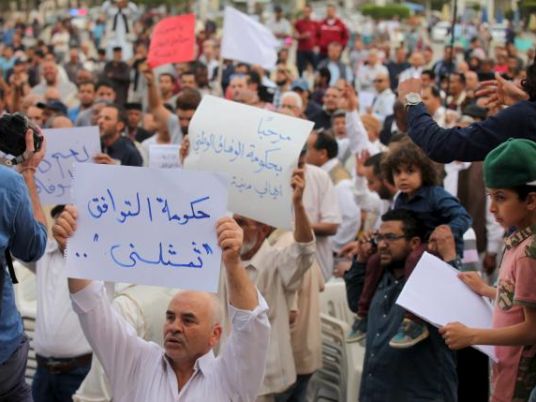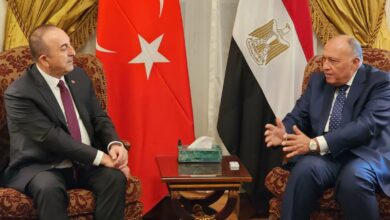
Leaders of Libya's UN-backed unity government ventured out onto the streets of Tripoli for the first time on Friday, amid signs of growing confidence in their bid for power.
Unity government head Fayez Seraj and other members of its Presidential Council attended prayers at a mosque and met people in the main square before returning to the heavily-guarded naval compound where they have been based since arriving from Tunisia on Wednesday.
Western powers are forcefully backing the unity government, hoping it will seek foreign support to confront Islamic State militants, deal with migrant flows from Libya to Europe and restore oil production to shore up Libya's economy.
But the new government has failed to win backing from Libya's two rival administrations and parliaments, one pair of which is based in Tripoli and the other in the east.
The head of the Tripoli-based National Salvation government, Khalifa Ghwell, has voiced strong opposition to any transfer of power, and Council members had to travel to Tripoli by ship after opponents shut down the capital's airspace.
But a statement posted late on Thursday on the National Salvation government's website struck a milder tone, saying opposition would be "by peaceful and legal means without use of force or incitement to violence".
"We will not cling to power," the statement said. "I demand that the revolutionaries, civil society and the senior clerics be given the opportunity to take the necessary decisions to avoid bloodshed and find a solution to the Libyan crisis."
The Presidential Council faces huge challenges as it seeks to establish itself in a deeply divided country dominated by brigades of former rebels. Oil production has plunged and Islamic State has established its most important base outside Syria and Iraq.
It has held meetings at the naval base with local politicians, lawmakers, bankers and businessmen as it begins its effort to take control of institutions in Tripoli and secure the backing of the capital's many armed groups.
An official at the Foreign Ministry in Tripoli said security forces loyal to the Council had secured the ministry building and that the minister previously appointed by the National Salvation government had left peacefully.
The situation in other ministries and government offices was not yet clear, though a spokesman for the National Oil Corporation (NOC) reiterated its support for the new government and said it was waiting for an invitation to meet Seraj.
Welcome
Security in Tripoli is volatile, but the city has been mostly calm since the Council members arrived on Wednesday. There have been small demonstrations in favor of the unity government, including one attended by several hundred people in Martyr's Square on Friday.
Earlier, 10 western Libyan towns and cities said they welcomed and supported the Council's arrival.
"The municipalities of the western coast are conscious that this is a critical stage," they said. "We call on all Libyans to be unified in their support for the Government of National Accord."
The UN Security Council called on the Presidential Council to "immediately begin its work in Tripoli to broaden the basis of its support and to tackle Libya's political, security, humanitarian, economic and institutional challenges, and to confront the rising threat of terrorism".
The European Union has imposed asset freezes and travel bans on Ghwell and the heads of the parliaments in Tripoli and the east, citing their role in obstructing the unity government. Those sanctions took effect on Friday.
"The measures today constitute a first important step in support of the government of national unity," French Foreign Ministry spokesman Romain Nadal told reporters.
"We are ready to consider if needed a widening of the sanctions list to other individuals who could prevent the installation of the this government," he said.




